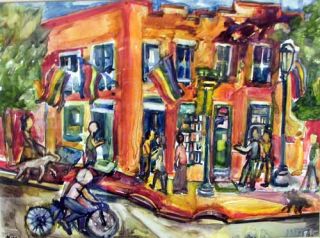Resilience
How the Oldest U.S. LGBTQ+ Bookstore Supports Resilience
A Personal Perspective: Philly's Giovanni's Room offers far more than books.
Updated June 13, 2023 Reviewed by Abigail Fagan
I not only attended, but participated in, my first Pride Day in Boston way back in 1982. Only a few months earlier I had decided to finally stop denying that I was gay, and to embrace my truth instead. Two years after my graduation from an evangelical college on Boston’s North Shore, there I was marching in a parade along with the many others who also had chosen to live with integrity and openness instead of hiding in a closet of duplicity and shame.
No one knew at the time that the new “gay disease” first reported just as I was “coming out” in 1981 would metastasize into a world-changing pandemic, or that in the years ahead it would claim the lives of so many of my friends. I certainly had no way of knowing on that Boston Pride Day in 1982 that two decades later I myself would be diagnosed as HIV-positive.
Only one thing was certain: I finally felt free.
Having been an English major in college, books were still an important part of my new life as an “openly” gay man. In 1982, “gay studies” was a new literary category. Working in Emerson College’s career office and taking classes in the college’s professional writing and publishing program, I regularly read Publishers Weekly to find new gay-themed books. That’s how I found out about a new translation by poet Richard Howard of Andre Gide’s 1924 book Corydon, a series of four Socratic dialogues that amount to an apologia for homosexuality as a natural variation of human sexuality.
After reading another book on how to write a query letter, I proposed to review Corydon for the Advocate, the national LGBTQ+ magazine. Then-cultural editor Mark Thompson liked my pitch and assigned the review. That’s how my writing career began. Book reviews were followed by feature stories and, beginning in the late 1990s, writing books of my own.
Naturally I spent a lot of time in bookstores, perusing and buying and eventually reading from my own books. One of the bookstores where I read my 1999 book Victory Deferred: How AIDS Changed Gay Life in America was Giovanni’s Room, in Philadelphia. Founded in 1973 and named after James Baldwin’s gay novel Giovanni’s Room, the bookstore today is the oldest LGBTQ+ bookstore in the United States still operating.

So many bookstores have closed as Americans have shifted their book-buying online. Besides the move toward shopping on the Internet, LGBTQ+ bookstores have faced competition they never had before as more “mainstream” bookstores also began to carry LGBTQ+ books.
Giovanni’s Room wasn’t immune. The store actually planned to close in May of 2014 because it couldn’t make a profit in the post-Amazon world. That’s when Philadelphia AIDS Thrift reached out to ask how they could help keep the doors open. The nonprofit raises funds it distributes through grants to city HIV/AIDS service providers. To date, it has raised more than $4.1 million.
“A different business model of half new books, half thrifted items, was devised to help cut down on overhead costs,” says Katharine Milon, co-manager of Philly AIDS Thrift@Giovanni’s Room, as the combination thrift and bookstore is known today. “We offer a larger variety of items this way, at a variety of price points, all while maintaining our original mission of showcasing new and classic LGBTQ+ books.”
I asked Milon about the role that a bookstore like Giovanni’s Room plays in the lives of LGBTQ+ people. “They provide a real point of human contact,” she says, “a potential meeting space, and in the case of LGBTQ+ bookstores especially, being physically surrounded by the recorded narratives and experiences of one’s history, one’s community, and the hopes for our collective future.”
This is why LGBTQ+ bookstores have always been so much more than bookstores, and why Giovanni’s Room has been called “the center of gay Philly.” It’s not simply because the store is located at the corner of 12th and Pine streets in the heart of Philadelphia’s “gayborhood,” as it’s known. Milon says the bookstore since its founding “has always served as an information and cultural resource, a place where people can come knowing they will either be accepted on their own terms or be given access to the resources and information they need.” She adds, “That was true in the ‘70s when the store was at the forefront of the Gay Liberation movement. It was true in the ‘80s with the HIV/AIDS crisis. And it was true in the ‘90s and ‘00s in the aftermath of that crisis and the need for community organization and political movements in order to protect a decimated community.”
Fifty years since its founding, Giovanni’s Room continues to provide a safe and welcoming space for members of the LGBTQ+ community and our allies, to connect with other people and with literature that speaks to our experiences. Besides offering books, the bookstore regularly hosts popular events such as a book club, readings, and gallery installations for local artists, poets, and writers.
Giovanni’s Room is clearly more than a bookstore. In its first half-century, it has played an important role in helping to support and sustain the resilience of Philadelphia’s LGBTQ community—and of countless individuals. They may have gone in to shop for a book, but they usually walked out with a strengthened sense of self-esteem, solidarity, and hope for the future.




